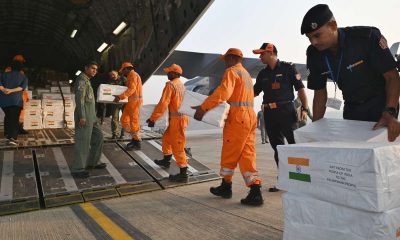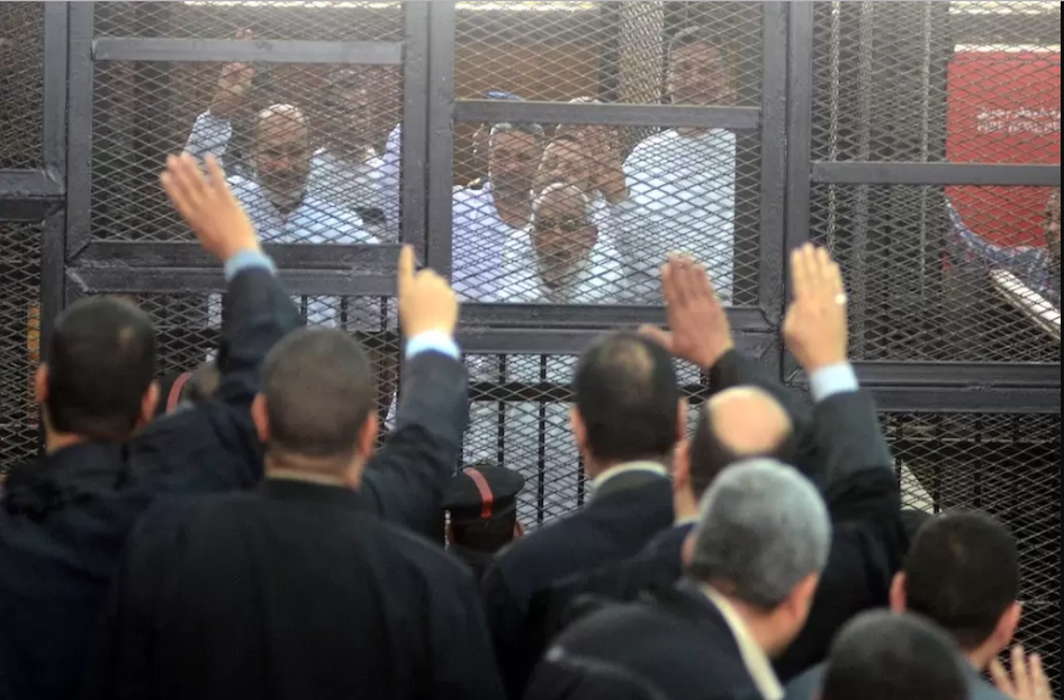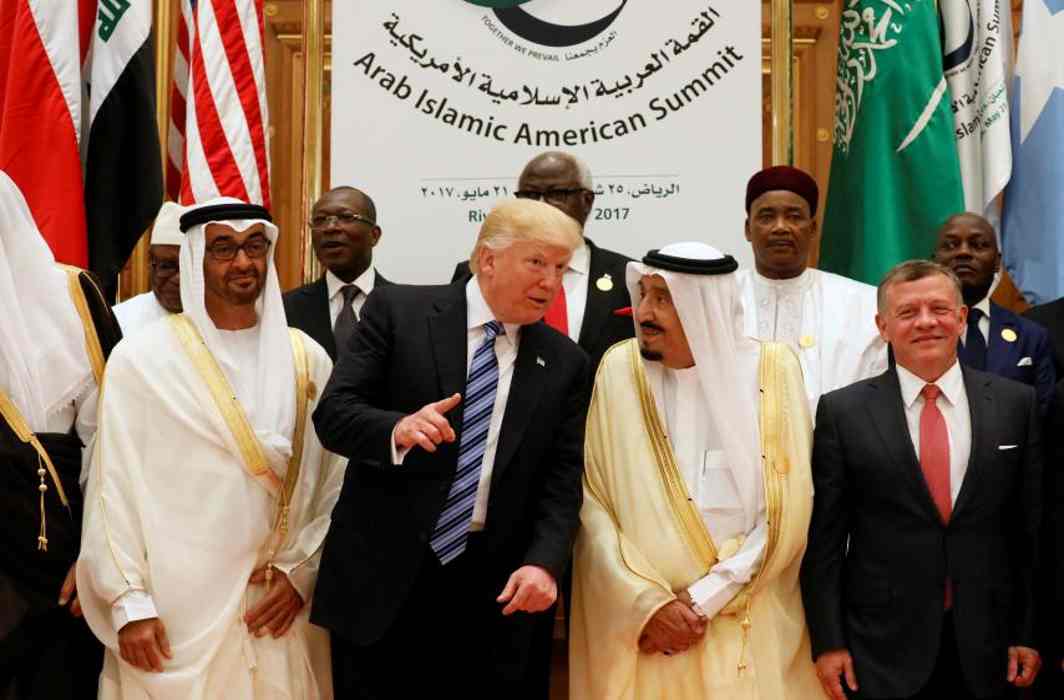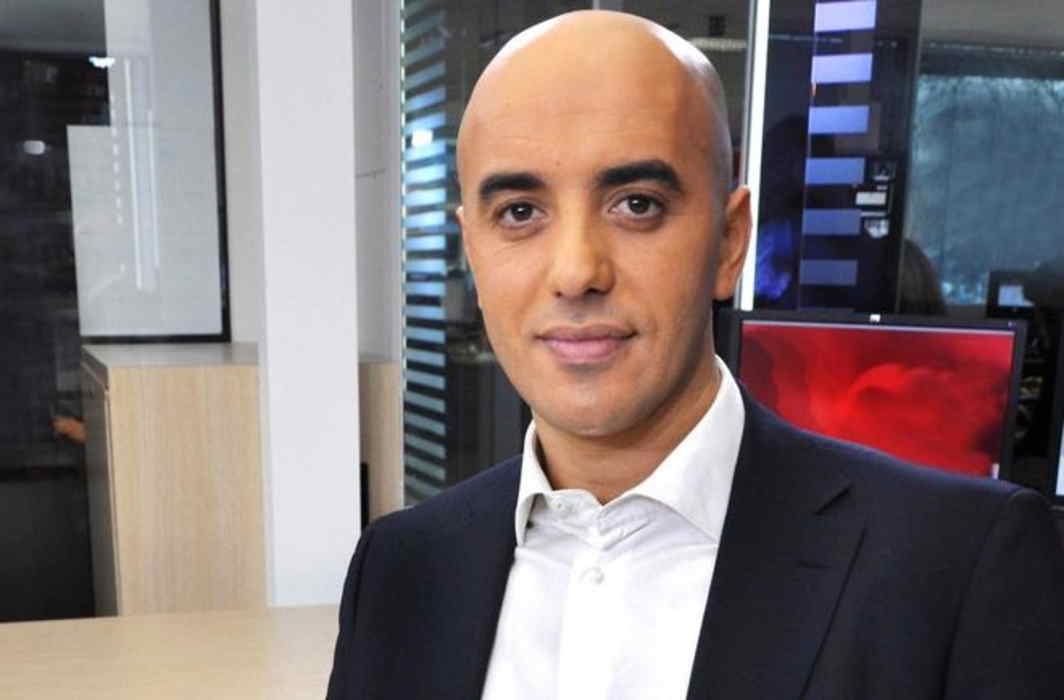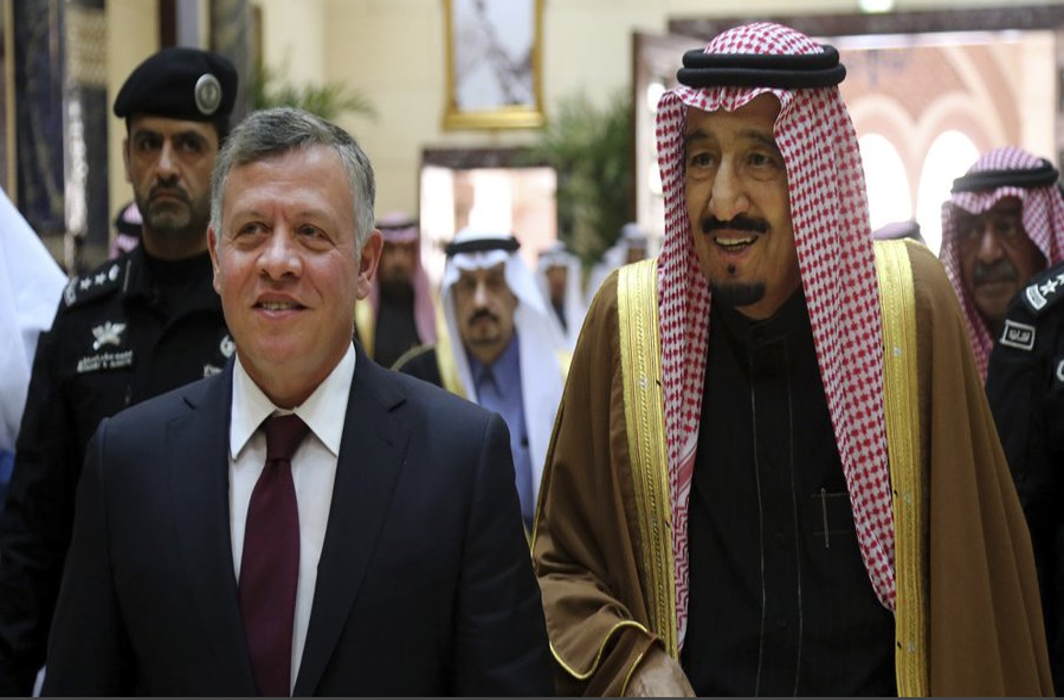Latest world news
Egypt: President Sisi vows to hit hard terrorists for attacking worshippers
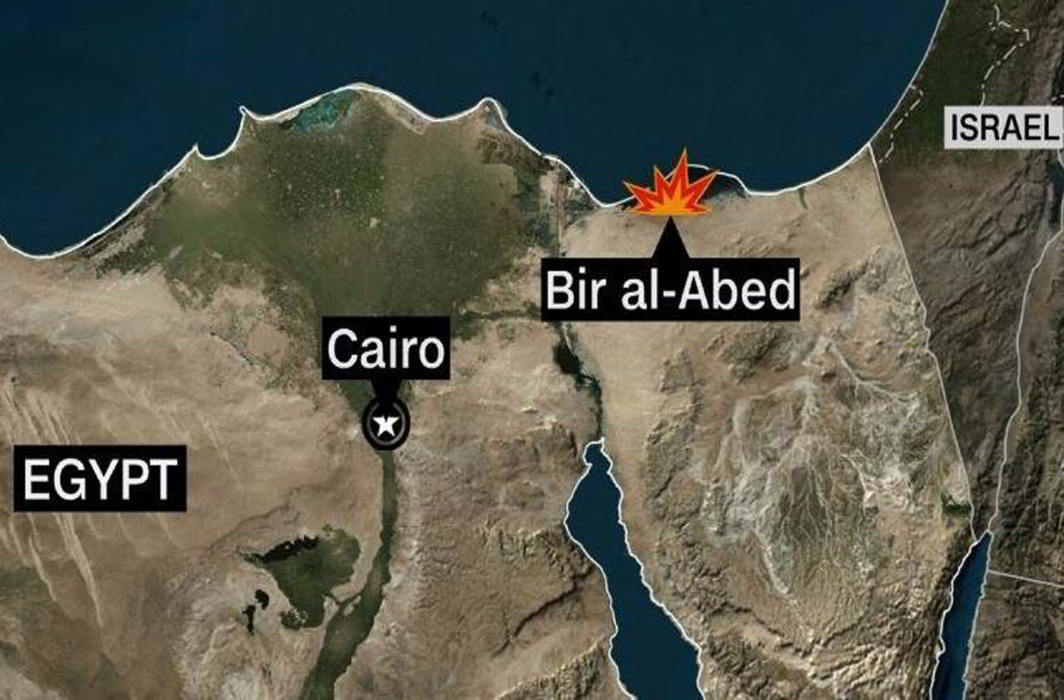
War planes attack terror hideouts
Egyptian President Abdel Fattah el-Sisi has condemned the attack on Sufi mosque in Sinai Peninsula describing it as a “criminal” and “cowardly” act, expressed condolences to the victims and vowed that the attack “will not go unpunished”.
While addressing the nation on a live telecast on Friday evening, President said, “The armed forces and the police will avenge our martyrs and restore security and stability with the utmost force.” The Egyptian government has declared a three-day mourning for the victims.
The Egyptian military launched air strikes on targets in mountainous areas around Bir al-Abed hours after the attack, security sources and witnesses told Reuters news agency.
Latest reports, quoting military spokesman Tamer Rifai said in Cairo, on Saturday, said that Egyptian warplanes conducted airstrikes on “terrorist outposts” and vehicles after attackers killed 235 people in Bir al-Abed, in northern Sinai.
“The Egyptian Air Force pursued the terrorist elements, discovered and destroyed a number of vehicles that carried out the brutal terrorist killings, and killed all terrorists inside those vehicles,” the spokesman said.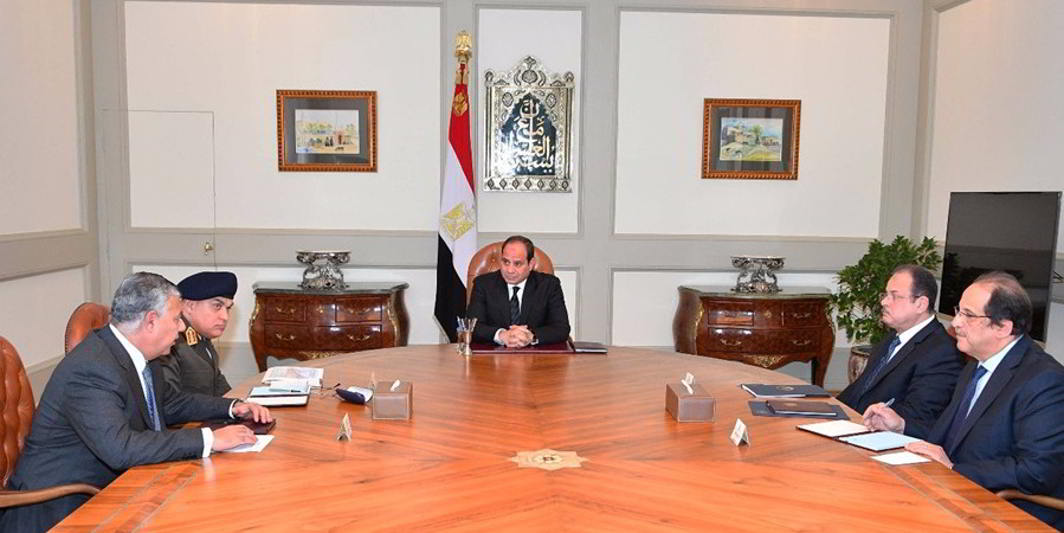
Terrorists attacked the worshippers on Friday with a bomb and guns on at Al-Rawdah Sufi mosque in Bir al-Abed, 40 km west of El Arish the provincial capital of north Sinai. Egyptian media reports that 235 people were killed and over a hundred people were injured in the attack.
The Bir al-Abed mosque was considered to be an easy target as it is situated outside the main cities. The worshippers coming to the mosque follow Hanafi Sunni sect. Saudi groomed Wahabis consider them as infidels.
The mosque was frequented by Hanafi Muslims. Large numbers of security personnel attend prayers in this mosque.
So far no group has claimed responsibility. A local terror group Velayat Sinai, considered as an affiliate of Daesh IS has claimed earlier terrorist attacks.
The terrorists arrived in four when driven vehicles and carried out their attack during the sermon after Friday prayers. The attackers had reportedly planted explosives and then opened fire on worshippers. The fleeing worshippers were also gunned down in large number.
The region has previously witnessed several attacks targeting security forces and members of Egypt’s Coptic Christians community.
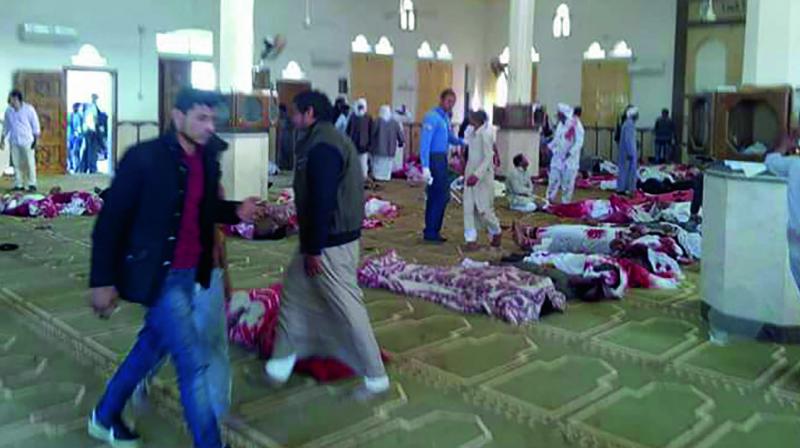 In 2016 IS terrorists released pictures of executing a 100 year old Sufi religious leader accusing him of “witchcraft”.
In 2016 IS terrorists released pictures of executing a 100 year old Sufi religious leader accusing him of “witchcraft”.
Timothy Kaldas, a professor at Nile University in Cairo, believes that the attack “fits the pattern of ISIS attacks”. He understands, “Potentially, it’s another attack against Sufis in northern Sinai. Potentially, it’s retaliation for tribes co-operating with the state in the crackdown on ISIS.”
Almost all terrorist groups including Daesh (IS) responsible for creating havoc in Syria, Iraq and Libya, Al-Qaeda and Taliban active in Afghanistan, Al-Shabab and Boko Haram, indulged in destructive activities in some of the African countries are considered to be followers of the Wahabi ideology.
Last month Saudi Arabia’s Crown Prince Mohammed bin-Salman had vowed to destroy “extremist ideologies” in a bid to return to “a more moderate Islam.”
He was quoted saying, “Seventy percent of the Saudi population is under the age of 30. In all honesty, we will not spend 30 years of our lives dealing with extremist ideologies. We will destroy them today and immediately.”
Latest world news
World Earth Day 2024: Google Doodle showcases aerial view of planet’s natural beauty
Google celebrated Earth Day 2024 with a special doodle featuring an aerial view of our planet’s biodiversity.

Google shared a doodle today to celebrate World Earth Day 2024, which showcased aerial photos of the planet’s biodiversity and natural beauty. Google reminded us of the importance of protecting planet earth for future generations with the help of this doodle.
The Google letters depict specific locations across the globe where people, communities, and governments work every day to help protect the planet’s natural beauty, biodiversity, and resources, according to the explanation of the annual Earth Day 2024 doodle on their website.
It said, these examples remind us that there’s much more to do to address the climate crisis and biodiversity loss, but also offer the promise of hope and optimism.
The islands of Turks and Caicos are represented by the letter “G.” The islands’ conservation efforts are concentrated on protecting important regions for biodiversity and addressing persistent environmental problems.
The largest reef in the southern Gulf of Mexico and a UNESCO biosphere reserve, Scorpion Reef National Park, is represented by the letter “O” in the Mexican flag.
The letter “O” features Iceland’s Vatnajokull National Park, which was designated as a national park in 2008 following decades of advocacy. The ecology within and surrounding the biggest glacier in Europe is safeguarded by this UNESCO World Heritage Site.
The letter “G” has the Jau National Park in Brazil on it. It is a UNESCO World Heritage Site and one of the biggest forest reserves in South America.
The Great Green Wall of Nigeria is represented by the letter “L,” and the Pilbara Islands Nature Reserves of Australia are represented by the letter “E.”
Meanwhile, Earth Day is a worldwide event that promotes protection of the environment every year. April 22 serves as a reminder of the importance of conservation efforts and sustainable practices to guarantee a healthier world and a brighter future.
The occasion inspires people across the world to come together and take action to protect the environment, strengthening our bonds with nature and promoting good change.
Latest world news
Bigg Boss 14 contestant Rahul Vaidya struggles walking in knee deep water, compares Dubai rains with Mumbai floods
Singer and TV personality Rahul Vaidya was recently stranded in the Dubai rains.

Rahul Vaidya, who was in Dubai ahead of his show which was scheduled to take place today, left the country due to heavy rains and reached Kolkata. The artist shared on social media his encounters in the UAE city, including challenges like walking through knee-deep water. Rahul provided an update regarding the heavy rainfall in Dubai on his Instagram profile.
The Bigg Boss 14 contestant revealed that he was in Kolkata and prepared to do an evening performance. Recalling the terrifying period he went through, Vaidya said there was a lot of confusion and panic in Dubai. The situation was similar to that when heavy floods hit Mumbai in 2005.
Vaiday also posted seval other images and videos of cars that were underwater and flooded roadways. The Bigg Boss 14 contestant, who shared his ordeal, claimed that even though it had just rained for two hours, the situation was dire.
In one of the video, which went viral he can be seen struggling in walking in knee-deep water. He can be also seen holding his sneakers in one hand and with other hand he was seen managing other things.
This is the result of the two hours of rain that it had, he can be heard saying in the video. Vidya also said he dosen’t believe Dubai is accustomed to a lot of rain. Everything had stopped working, he remarked.
After taking part in the first season of the singing reality show Indian Idol, Rahul Vaidya gained widespread recognition. In addition to Bigg Boss, he took part in Khatron Ke Khiladi 11.
Meanwhile, heavy rains that triggered flooding in the UAE and Bahrain, which left 18 people dead in Oman on Sunday and Monday, have paralyzed the financial hub of the Middle East, Dubai.
A lot of incoming flights were diverted from Dubai’s international airport because of the rain. At 7:26 p.m., the busiest airport in the world for foreign visitors stopped accepting new arrivals; a gradual resumption was announced for more than two hours later.
Images of planes navigating flooded tarmacs are making the rounds on social media.
According to pictures shared on social media, the flagship malls Dubai Mall and Mall of the Emirates both experienced heavy floods, while at least one Dubai Metro station had water up to the ankles.
There were several road collapses, severe flooding in residential areas, and numerous reports of leaks from windows, doors, and roofs.
Due to the unfavourable weather, schools around the United Arab Emirates were forced to close, and as more storms are predicted, the closures are anticipated to last until Wednesday. The government of Dubai allowed its staff to work remotely till this Wednesday.
Latest world news
Dubai sky turns green during storm in UAE, video goes viral
The UAE witnessed record-breaking rainfall on Tuesday and the National Centre of Meteorology recorded 254 mm of rainfall in less than 24 hrs in the Khatm Al Shakla area in Al Ain.

1 person was killed in UAE as it witnessed heavy rainfall on Tuesday, stranding commuters, flooding roads, disrupting trains and flights and resulting in water leakage from mall ceilings. The UAE witnessed record-breaking rainfall on Tuesday and the National Centre of Meteorology recorded 254 mm of rainfall in less than 24 hrs in the Khatm Al Shakla area in Al Ain. It is being said that the rainfall was the highest documented since the start of data collection in 1949.
The heavy rainfall in UAE came days after a similar situation in neighbouring Oman, where 13 people were killed in flash floods. Many parts of Oman saw torrential rains, which caused students to be trapped in buses and swept away motorists and trapped people in their homes.
Videos from Dubai circulating on social media showed widespread waterlogging on roads in Abu Dhabi, Dubai and other important cities. This left daily commuters in cars and other vehicles struggling to get back home. Dubai metro station too was seen flooded and closed.
One such video circulating on social media shows the aerial view of the city of Dubai from the top of a building. In the video the stormy winds are seen blowing over the city of Dubai. As the storm intensifies the Dubai sky turns green and ultimately gets covered by heavy rainfall. The video has gone viral on social media with more than 1.1 million views.
Another video showed water leakage from the ceilings of shopping malls, flooding the floors and destroying goods. A video which was shot in the famous Mall of the Emirates, showed pieces of ceiling falling as the rainwater gushed inside. Videos from many outlets of the Deira City Centre mall chain showed escalators being rendered unusable. Majid Al Futtaim, the company which owns the Mall of Emirates, said that the shopping complexes have been kept open and the customers are being sent away from the flooded areas.
-

 Entertainment4 hours ago
Entertainment4 hours agoHappy Birthday Samantha Ruth Prabhu: Social media wishes Queen of South Indian Cinema on her 37th birthday
-

 India News6 hours ago
India News6 hours agoDelhi Congress President Arvinder Singh Lovely resigns, says he feels handicapped under Deepak Babaria’s leadership
-

 Cricket news7 hours ago
Cricket news7 hours agoIPL 2024: Rajasthan Royals beat Lucknow Super Giants by 7 wickets and 6 balls to spare
-

 2024 Lok Sabha Elections5 hours ago
2024 Lok Sabha Elections5 hours agoPM Modi criticises Rahul Gandhi for allegedly insulting Hindu kings, accuses Congress of not addressing atrocities by Muslim rulers
-

 2024 Lok Sabha Elections2 hours ago
2024 Lok Sabha Elections2 hours agoElection Commission orders AAP to modify Lok Sabha campaign song
-

 India News1 hour ago
India News1 hour agoSecurity forces arrest 14 Pakistani nationals with around 86 kg of drugs, worth Rs 600 crore near Gujarat Coast
-

 Entertainment12 mins ago
Entertainment12 mins agoDIL-LUMINATI TOUR: Diljit Dosanjh creates history by performing for 54000 fans in Canada, post goes viral

